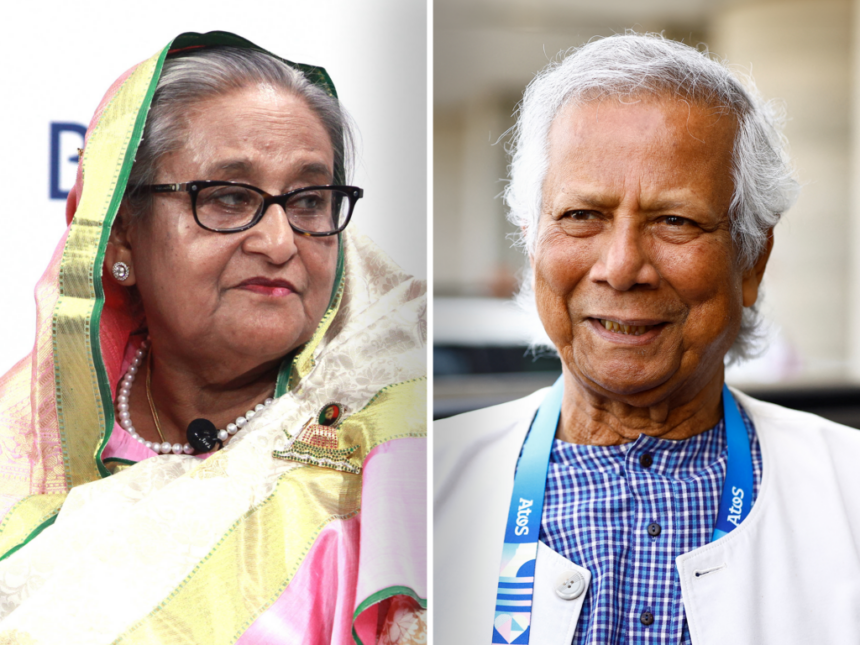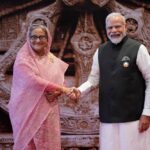Hasina is out. Yunus is in. Here are the three biggest factors to watch in Bangladesh.
The spectacular and rapid fall of Sheikh Hasina and her regime, followed by her ignominious exit from Bangladesh on August 5, is not only unprecedented in the history of the nation, which has previously experienced several, albeit less dramatic mass upsurges and downfalls of dictators in its turbulent history. It also surprised many Bangladesh watchers. The aura of invincibility that she and her party created over the past decade and a half crumbled in a matter of hours. A few weeks of demonstrations led by students and joined by people from all walks of life brought down the state’s administrative edifice. Moreover, the demonstrations did so despite the fact that the most lethal state apparatuses—the police, the Border Guard Bangladesh, the Rapid Action Battalion, and Awami League activists—were unleashed against the protesters with shoot-on-sight orders during the state-imposed curfew. The country, which was standing at the crossroads of closed autocracy and a democratic turnaround since the stage-managed election in January, suddenly watched a groundswell that appeared to be unthinkable even days ago.
Such dramatic developments have put the country in uncharted territory. Three aspects of the developing situation warrant attention.
What will the interim government look like?
On August 6, a day after Hasina fled Bangladesh, the country’s only Nobel Prize winner, Muhammad Yunus, was selected to lead the interim government. His name was proposed by the student protesters, who have spearheaded the movement. The choice of Yunus is a clear testimony that unlike on previous occasions, when political parties, in consultation with the military and bureaucracy, decided who would head the government, a new political force is making the decision this time around. The students have emerged as the center of power, and will seek to exercise that power in the selection of the interim government’s cabinet.
It is notable that the appointment of Yunus is beyond the purview of the existing constitution. While the political actors and army leaders appear to be operating with the understanding that Bangladeshi President Mohammed Shahabuddin is the chief executive, they seem to recognize that under the circumstances, all actions draw their legitimacy from the student-led movement.
How the remainder of the interim government will be formulated is unclear. While the cabinet is expected to reflect the country’s broad political spectrum and its civil society, it must represent the aspirations of the mass upsurge as articulated by the students, who have made it clear that this is not only about deposing an autocrat but also about creating a system that will prevent the rise of a future autocrat. In its language, this movement seeks to change the existing political settlement.
Can the interim government tackle the immediate challenge?
That the interim government will face enormous challenges is an understatement. Indeed, over the medium term, the country’s economic challenges will be the most formidable. But those pale in comparison to what the new government will face in the coming days. The most immediate challenge is to restore confidence in the administrative structure, including law enforcement agencies, while ensuring that those who committed transgressions are held accountable.
In the fifteen years that Hasina was in power, the state’s administrative apparatuses were too often filled with party loyalists who served the party first and acted beyond the remit of the law. Officials persecuted the opposition, siphoned off money from the country, and participated in a kleptocratic system. In a similar vein, many in law enforcement agencies have been involved in gross violations of human rights, including extrajudicial killings and enforced disappearances.
The same goes with leaders and officials in previous regimes. Holding them accountable for their alleged crimes is necessary for the sake of justice, but so too is the need to assure the public that this is something more than just one government replacing the old one with no other changes. Many Bangladeshis, including those from the business community, have either fled or are trying to flee. The government will have to act swiftly but avoid any impression of seeking revenge. It is a delicate balance to maintain, but imperative for going forward.
As an immediate aftermath of Hasina’s downfall, there were reports of looting, arson, and attacks on religious minorities from around the country. Roving mobs ransacked houses and offices. The situation is improving now, but a worrying development was reports of attacks by weapon-wielding individuals in various places. The death toll mounted. The identity of these attackers remains unknown, but the indiscriminate nature of these attacks gives the impression that they were intended to create an apparently lawless situation and destabilize the country. While some of these incidents can be described as settling personal scores, the scale makes it suspicious.
In the weeks leading to the demise of the regime, especially since the middle of July, when then ruling Awami League Secretary General Obaidul Quader threatened that the party activists were enough to confront the demonstrators, party loyalists had used lethal weapons in broad daylight. Individuals loyal to Hasina and her party might now see it as in their interest to create the impression of widespread chaos.
How will India react?
While the sudden change in Bangladesh has implications for the wider international community, its impacts are most immediately pertinent in neighboring India. Hasina’s decision to take refuge in India was not only predicated by its geographical proximity but also was due to her close connection to the Indian establishment. Since 2009, India has supported the Hasina regime and helped it to survive adverse situations. India’s business interests and desire to keep the country within its sphere of influence shaped India’s policy toward Bangladesh. Indian policymakers, analysts, and media have for years insisted that a change in the government in Bangladesh will create a security threat. They have tacitly suggested that stage-managed elections delivering victory to Hasina were preferable to free and fair elections that would have reflected Bangladesh’s popular will.
At the same time, Indian media has portrayed Bangladesh’s legitimate political opposition parties, including the Bangladesh Nationalist Party, as conspiring with Pakistan’s main intelligence agency. Even though anonymously sourced and devoid of any real evidence, such allegations are quickly becoming a mainstay of Indian media discourse. In the final days of her rule, Hasina insisted that the movement against her government was orchestrated by “militants” and “terrorists”—a message that several Indian news outlets have amplified in recent days.
This approach has now become a central element of Indian media discourse and policy making. Since Hasina landed in India, the mass movement that toppled her has been portrayed as an Islamist upsurge, and some in the Indian establishment are highlighting the violence in Bangladesh since her departure more than the autocratic nature of her governance. The statement of External Affairs Minister S Jaishankar to the Indian parliament on August 6 is a case in point. The meeting between Indian National Security Advisor Ajit Doval and Hasina at Hindon Airbase near Delhi upon her arrival also sends the message that India is most concerned with the security aspect.
As the situation in Bangladesh is unfolding, the Indian establishment will be better served if it revisits its Bangladesh policy and acknowledges the underlying causes that led to Hasina’s downfall. In recent months, an “India Out” movement, akin to a campaign that emerged in the Maldives several years ago, has gained attention in Bangladesh. A large segment of Bangladeshis seem to feel that Indian policy since 2009 had deprived them of their right to freely choose their leaders and that an unequal relationship was forged with Hasina. The sooner that Indian policymakers acknowledge the necessity to recalibrate their country’s policy, the sooner a better relationship with the interim government can emerge.
By: Ali Riaz – a nonresident senior fellow at the Atlantic Council South Asia Center and a distinguished professor at Illinois State University.
Source: atlanticcouncil.org







